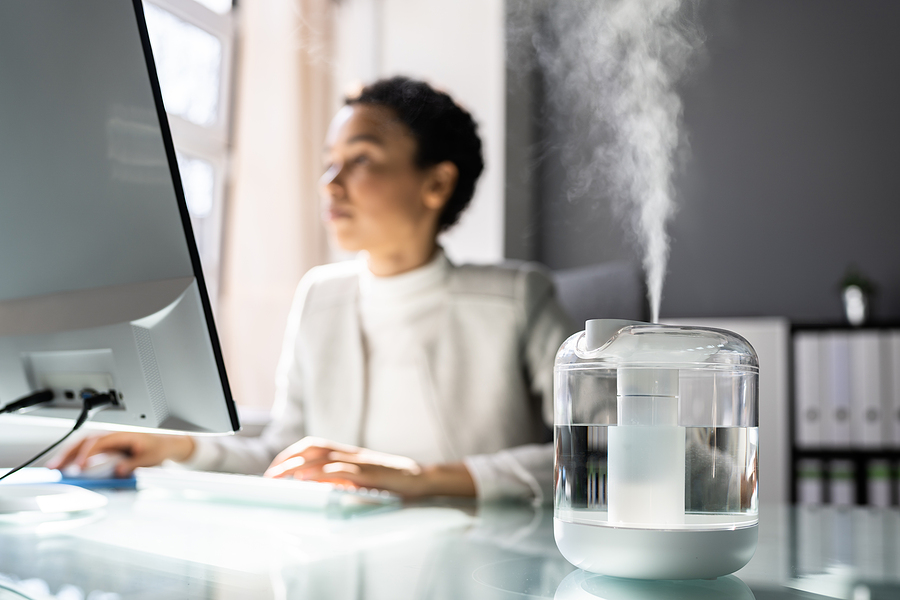
October 22, 2021 l Tara E.
Do You Need a Humidifier for Winter?
Humidifiers for the winter months can drastically improve the quality of air in your house. Unfortunately, this time of year usually equates to dry skin if you’re in a climate that drops below 40 degrees Fahrenheit. As a result, your hands and feet transition into an ashy state while your lips and face decide to shed skin like a snake.
Although there are lotions and potions out there to quench the thirst of your skin, chapstick, and lip gloss to moisturize your lips, what are we to do about waking up with a dry or stuffy nose, cottonmouth, and scratchy throat from running your heater all night long?
During the colder months, the relative humidity in your home can bottom out to a low of 10 to 20 percent. Experts suggest that anytime the humidity drops below 40% in your home, you should consider investing. Dry air leads to dry skin and mucus membranes like your nose and mouth. While you may find ways to navigate these issues during the daylight hours, the nighttime may prove another story. Dry air in your home can cause you to snore, making others around you miserable. In addition, those with allergies may experience gnarly flare-ups under these conditions.
While adults may find themselves miserable under these conditions, babies are also at risk for a restless night. The good news is that humidifiers can offer a wealth of health and home environment benefits and combat the side effects of dry air for babies and adults.
Can Humidifiers Help Respiratory Issues?
Humidifiers and Asthma
Do you have asthma? What are the risks that you might catch a cold this winter? Or catch the flu? By now, you know that between stuffy noses or burning sinus passages, dry air is the last thing you want to experience amid a miserable time. Good news! Humidifiers can help relieve symptoms associated with the common cold as well as respiratory distress issues. In addition, humidifiers produce enough moisture to help reduce dryness in nasal cavities.
For those who have asthma, there is a fair amount of anecdotal evidence from users that humidifiers go a long way to improving breathing for those living with asthma or allergies.
Healthcare professionals offer this word of caution for those with allergies and asthma. Take great care to keep dust at bay and other allergens when using a humidifier. Humidifiers may create the perfect storm for allergen growth which can worsen your symptoms.
Humidifiers for Dry Skin and Dry Hair
Dry air can strip away the lipid barrier that holds moisture in our skin. When this happens, we lose water, and as a result, our skin cracks. In addition, allergens and bacteria can slip into these cracks and cause peeling. Humidifiers can work wonders for cracked, dry, and itchy skin during the winter months. They serve as a natural moisturizer of sorts, helping to reduce these side effects of dry air.
Humidifiers for Static Electricity
There’s nothing like static electricity during the winter. Ever been walking through your home and touching a doorknob or, better yet, walking down the aisle in the grocery store, only to touch a bit of metal and light yourself up with a static electricity shock? Yes, dry air is the main culprit that makes an environment conducive to the development of static electricity. However, dry air can also damage computers and other electrical equipment, which is another reason a good humidifier can prove beneficial, decreasing the amount of humidity in the air.
What are the Best Humidifiers for Winter Months?
Not sure which humidifier to buy? Experts recommend using a humidifier with a removable tank to allow easy cleaning and refilling of fresh water. For example, the Vornado EVDC500 Energy Smart Evaporative Humidifier has a removable tank. Ideally, you will want to select a humidifier that can humidify a single space –such as a bedroom or home office space. One of the MSTY staffers who purchased the Vornado Ultra3 Whole Room Ultrasonic Humidifier has not stopped singing its praises.
The Vornado Ultra3 Whole Room Ultrasonic Humidifier offers dry air sufferers a tiny solution to establishing a humidified environment. Rather than waking up with a dry nose and mouth, you awaken feeling refreshed and in the fitting room as if you have stepped into a soothing, spa-like, and tropical environment. There are many humidifiers on the market, so ultimately, you will have to research and purchase the one that best meets your needs.
How to Keep Your Humidifier Clean
Have you decided to purchase a humidifier for the winter months yet? If so, you will need to know that there are a few maintenance requirements. First, you must change the water once per day. Ultrasonic and cool-mist humidifiers are at risk for growing mold, microorganisms, and bacteria. Therefore, you should not allow the water to sit in the tank without running it. Second, if the water stands for a period, you must empty the tank and replace it with fresh water. Failure to do so increases the risk that rather than dispersing a fresh, cooling mist into the air, you will release microorganisms that will eventually impact your health for the worst. Finally, humidifiers should be cleaned one to two times per week using a three-percent hydrogen peroxide solution or a three-to-one distilled water and vinegar mixture.